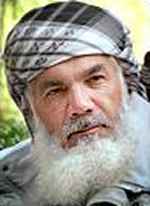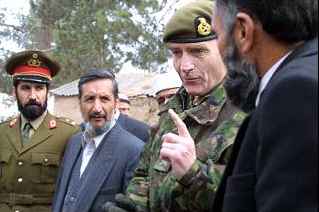| Shortly after the U.S. military
campaign in Afghanistan began last October, Khan joined forces with the
Northern Alliance, which drove the Taliban and al-Qaida forces from Herat.
And although he currently
holds no official title under the interim government headed by Hamid Karzai,
his grip on this strategically crucial city is unquestionable.
Not even a single passport
can be processed without the personal authorization of the warlord himself,
one resident said.
But Khan’s reign has brought
a ray of hope to Herat. Like other cities throughout Afghanistan, the Taliban’s
extreme form of Islam has been banished: Girls are back at school, men
need not wear long beards and there is music in the streets.
But there remains dire poverty
and a great deal of political intrigue.
RENEWED RIVALRIES
On Tuesday, the commander
of Afghanistan’s international security force held talks with Khan after
rival warlords threatened to march on the city.
Britain’s Gen. John McColl,
head of the International Security Assistance Force, had breakfast with
Khan in a mansion next to a military base on the ancient city’s outskirts.
Khan’s foreign affairs spokesman,
Mohammad Ullah Affali, said the talks between McColl and Khan were likely
to cover the possibility of international troops being based in Herat.
“We are discussing
the situation. I don’t think there will be a problem. Maybe there will
be a need, maybe not,” he told Reuters. |
 |
Reports of Iran supplying
weapons to forces in Herat have raised consternation in neighboring provinces.
The governor of Kandahar,
Gul Agha Shirzai, threatened to march 20,000 fighters to Herat to rid southwestern
Afghanistan of soldiers equipped by Iran.
Shirzai claimed that the
soldiers were preying on ethnic Pashtuns in trucks carrying his trade convoys,
raising fears of internecine fighting.
But Iran has vehemently denied
accusations of meddling in Afghan affairs. During U.N. Secretary General
Kofi Annan’s recent visit to Tehran, officials denied they were arming
any of the factions inside Afghanistan. Iran also declared full support
for Karzai’s government.
But suspicions remain. On
the main road connecting Iran and Afghanistan, numerous trucks with Iranian
plates roll by, making their way deep into Herat and beyond. And the presence
of a functioning Iranian consulate in the city center is a strong reminder
of the close relations between Tehran and Herat.
FLORENCE OF ASIA
The largest city in western
Afghanistan with an estimated population of 140,000, Herat is about 500
miles from Kabul.
It’s through its proximity
to Iran, only 75 miles away, that Herat gained a reputation as a commercial
and cultural crossroads in the region.
The city dates to the days
of Alexander the Great, who began construction of a magnificent citadel
here. The golden age of Herat was in the 14th and 15th centuries, when
the city was known as the Florence of Asia. The past splendor is still
obvious when you visit the city’s mosque, a breathtaking piece of architecture
with its fine tiles and marble foundation.
But Herat’s glory has mostly
faded. As in the rest of the country, most intellectuals with means to
escape have long left the city.
A dusty city locked in time,
mud huts and shacks line Herat’s streets, while horse-drawn carriages and
men riding on mules zigzag between rundown buses and overloaded trucks
down bumpy, pot-holed boulevards.
Alexander’s once grand citadel
is surrounded by half collapsing mud huts, and just outside its walls,
local people have turned one of its vantage points into a public latrine.
Nearby is Maslakh camp, home
to more than 180,000 Afghans who have taken refuge from a deadly three-year
drought that has left most of Afghanistan without crops and food.
According to aid workers,
this is the world’s largest camp for internally displaced people. Even
today, desperately hungry Afghans arrive at this camp daily.
“Nobody wants to move from
the camp. They know there is food and security here,” said Alejandro Chicheri
of the World Food Program.
At the sprawling complex
of mud houses and tents, there is at least enough food for the people to
stay alive. But it’s not the plight of these hungry refugees that draws
the attention of the world.
AN AUDIENCE WITH KHAN
NBC was recently summoned
to Khan’s office for a late-night news conference along with a dozen other
foreign journalists.
As he sat as his desk, journalists
bided their time while a group of men sought his signature on various permits
and documents.
Two elderly scribes sat at
the back of the room, pen and paper at the ready, to jot down every word
their master would utter during the news conference, where the media focused
on his ties with Iran.
“We’ve always had friendly
ties with Iran, a country which has supported Afghanistan through its war
against the Soviet occupation and the Taliban,” Khan said through his interpreter.
“Over 2 million of our people are refugees there, and some of our commanders
still have their wives and children living in Iran. So it is natural for
us to have close relations with them. But there is no military assistance
coming our way from Iran.”
Different versions of the
same question were posed over and over again, but the warlord’s reply was
consistent.
After the news conference
wrapped up, the media convoy was escorted by Khan’s officials as it was
past the 10 p.m. curfew in Herat. Along the pitch-black street, well-disciplined
and business-like soldiers loyal to Khan manned several checkpoints.
Even in the darkness, their
brand-new green fatigues and polished guns were visible, raising the
obvious question of who’s
financing Khan’s force in this impoverished city.

|

